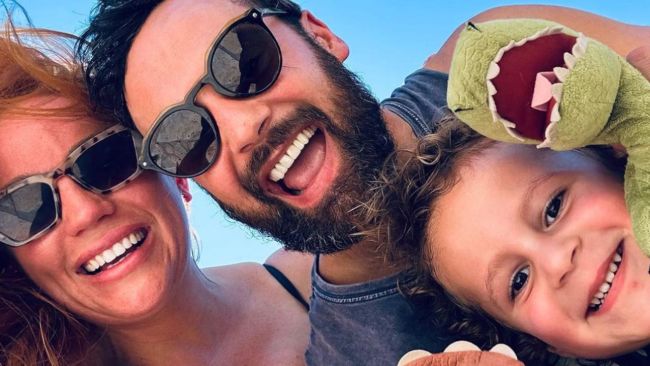I thought to myself: 'Would it matter if I wasn’t here?’
After breaking her silence on her debilitating PMDD diagnosis last week, MAFS star and mum Jules Robinson opens up about her darkest times and why it's important to spread awareness.
Lifestyle
Don't miss out on the headlines from Lifestyle. Followed categories will be added to My News.
After sharing my PMDD (Premenstrual Dysphoric Disorder) diagnosis last week on The Juggling Act podcast, I have been blown away by the response I received.
As I sifted through the hundreds of DMs and voice notes women sent me, each one sharing their personal experiences and stories, one thing became really clear to me — so many more people are affected by this than we think.
Stats online say that it’s around 8% of women, but I’m convinced it’s more like 8% of my Instagram followers!
Now it’s time for us to realise that we aren’t alone in this anymore and we no longer have to suffer in silence.
Want more TV news? Sign up to Kidspot’s Talking TV newsletter for all the up-to-date news sent straight to your inbox.

The response has been overwhelming, but all very positive
Generally, the response has been, “Thank you so much for speaking up” or “I’m going to go to the doctor now” and a lot of “I just thought I was crazy.”
There were also countless women who thought their daughters might have it, or that they themselves have had it for decades without knowing.
It’s saddening that this condition goes so underdiagnosed, but it’s easy to see why. PMDD can present similarly to its little, more chill sister, PMS.
But this is not your standard PMS… this is not ‘normal’.
PMDD is in a different stratosphere to PMS. I’ve even had women telling me that they’ve gone to doctors, only for them to Google what PMDD meant in front of them. Yikes!
But it’s not only doctors that aren’t equipped to deal with this. Another common theme I saw pop up was that even the most compassionate and supportive partners struggled to know how to deal with the issue too.
For me, I made sure to tell Cam early on what I was going through. I joked that he should ‘just put me under the stairs once a month’ because I’m not great to be around.
But it really is a constant struggle women have to navigate - not only the intense emotional and physical symptoms but the toll this can take on their relationship too.
RELATED: Jules Robinson reveals how she is trying for a girl
On the darkest thought I’ve ever had
Sadly, one of the messages I received was from a woman whose sister died of suicide just seven weeks ago. Her response to me was, “My family wish we took it seriously and we listened to her.”
It was heartbreaking to hear. But it forced me to reflect on my own experiences, and I too, went to some pretty dark places.
As I mentioned on the podcast, the hardest time of going through PMDD was when I was in Bali. I had very dark thoughts like, ‘What would it matter if I wasn’t here?’
That’s when I had to take a step back and really think, what on earth is going on? Why am I thinking like this? What am I going through?’
While the severity varies month-to-month, that was definitely the worst time for me. A standard month usually involves just cutting yourself off from the world, not wanting to see or speak to anyone, sobbing and crying and just wanting to sleep your life away. I can also be super irrational and aggressive.
You just don’t know how it’s going to go each month.
The process of getting diagnosed
I was a bit fortunate in this regard because I had a record of going to the doctor multiple times and basically saying, ‘This is how I feel’.
I also think because of just having Ollie and being three months post-partum, it was originally kind of thought of as a bit of post-partum depression or ‘just going through the motions’ and the hormones of being a new mum.
But because I had on record how I was feeling from the previous visits, by the third time I went, they realised that this was a pattern. Then the doctor gave me a quiz and asked me lots of questions about my symptoms and then I was diagnosed.
It was reassuring to get the official diagnosis, but I felt like knew it all along.
I always knew I wasn’t stable around that time (to put it lightly!) and it just got worse and worse after having a baby.
As women, we are so intuitive to our feelings and our bodies, so you just know and you have to trust your gut.

RELATED: PMS and you – symptoms, causes and what can be done about it
“I want women to feel like they can talk about this openly”
After speaking out and getting the response that I did, I feel like I now hold some responsibility to help raise awareness about this issue in Australia.
The ripple effect in the last 10 days has been huge, so I definitely think there is such a big space here to make a difference. I’d love to see change, even starting in a workplace setting. It would be great if women could feel like they could give their employers a heads-up about what they’re going through each month.
In terms of finding a solution to PMDD, every woman is different, so it’s important you find a health professional and treatment plan that works for you.
I’m personally still navigating my way through this and am currently using natural approaches and Ayurvedic medicine. You just have to find what works for you.
More Coverage
Originally published as I thought to myself: 'Would it matter if I wasn’t here?’








